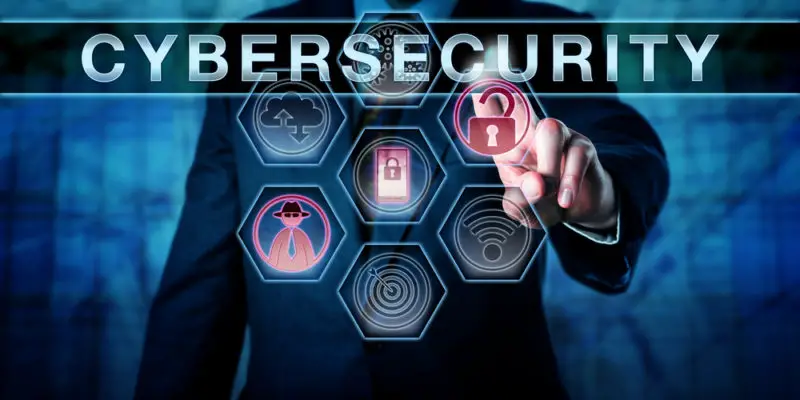One popular cybersecurity certification pathway is the CompTIA Security+ certification, followed by the Certified Information Systems Security Professional (CISSP) certification.
The CompTIA Security+ certification is an entry-level certification that validates the foundational knowledge and skills required to secure computer systems and networks.
It covers topics such as network security, threats and vulnerabilities, identity management, and cryptography.
The CISSP certification, on the other hand, is a more advanced certification that requires a minimum of five years of professional experience in the cybersecurity field.
It covers eight domains of cybersecurity knowledge, including security and risk management, asset security, and software development security.
In the ever-evolving landscape of the digital world, the fundamental need for cyber security continues to amplify. Whether it’s safeguarding personal information on a smartphone or defending national security infrastructure, the essence of securing digital touchpoints is paramount.
This article addresses the importance of cyber security in the current digital age, the diverse range of cyber security certifications, and the journey of becoming a certified professional in this field.
Furthermore, it covers the strategies for preparing for these certification examinations and emphasizes the value and advantages that these certifications can bring to your career.
Understanding the Importance of CyberSecurity
Understanding the Importance of CyberSecurity
In the current digital age, cyber security has become paramount. Cybersecurity is a rapidly growing field that plays a significant role in the world economy and is a critical component of the daily operations of businesses and governments alike.
The increasing dependence on digital infrastructure has, unfortunately, exposed sensitive user data to potential threats. This necessitates the importance of having skilled and certified professionals capable of protecting sensitive data from emerging digital threats.
Digital threats range from social engineering, such as phishing or baiting, to more advanced techniques like SQL injections and denial-of-service attacks.
Cyber-attacks have evolved to become more sophisticated and harder to prevent, leading to an increased global demand for cybersecurity experts.
Risks & Potential Impacts of Cyber-attacks
The risks and potential impacts of cyber-attacks are immense. For individuals, the compromise of personal information could lead to identity theft and financial loss.
Such attacks can damage reputations, relationships, and mental health. On the organizational level, a significant breach can lead to extensive financial losses and regulatory penalties.
It can disrupt operations and cause irreparable damage to customer trust and brand reputation. More importantly, for governments, a major cybersecurity breach could affect national security, public services, and economic stability.
Why Cyber Security Certification Matters
The increasing digitization of industries has led to a surge in demand for certified cybersecurity professionals across all sectors.
Cybersecurity certifications not only allow IT professionals to demonstrate their knowledge and skills to potential employers but also allow employers to validate the proficiency and credibility of their potential hires.
A certified professional is trained to understand, diagnose, and mitigate threats effectively, thereby minimizing the risk of a successful cyber-attack.
They also keep updated with the latest cybersecurity trends and threat landscape, enabling them to develop proactive defense measures and strategies.
Cyber Security Certification Pathway
The Cybersecurity Certification Pathway typically starts with foundational certifications such as CompTIA Security+, which covers the core knowledge required of any cybersecurity role and provides a springboard to intermediate-level cybersecurity jobs.
The next level up includes more specialized certifications like Certified Information Systems Security Professional (CISSP) or Certified Ethical Hacker (CEH) that provide a deeper knowledge of security systems and ethical hacking, respectively.
The pathway to becoming a high-level expert or specialist in a particular aspect of cybersecurity, such as a Forensic Analyst or a Security Architect, often requires advanced certifications like the Certified Cyber Forensics Professional (CCFP) or Certified Information Security Manager (CISM).
This route usually involves several years of experience and an in-depth understanding of complex cybersecurity systems.
In a nutshell, embarking on a cybersecurity certification pathway means undertaking a systematic and progressive journey.
This route enables individuals to gain and endorse their expertise in cybersecurity — a crucial factor in effectively tackling increasingly sophisticated digital threats.

Different Types of Cyber Security Certifications
Beginner’s Journey into Cyber Security Certifications
The commencement of this pathway is marked by entry-level cybersecurity certifications. These are engineered for those making their initial strides in this domain.
Although there isn’t a stringent requirement for extensive experience, a rudimentary understanding of the basics generally proves beneficial.
1. CompTIA Security+
This falls under the first set of certifications. It highlights aspects like network security, threat management, and the fundamentals of system infrastructure.
Recognized globally, this certification stands as a testament to best practices in IT security. The only necessity to conquer this level is a successful pass in an exam, with no preconditions.
2. (ISC)2 Systems Security Certified Practitioner (SSCP)
Moving forward, this certification aligns well with IT administrators, managers, directors, and professionals dealing with network security. It underscores the practical application of security concepts.
A minimum of one year of cumulative work experience in one or more of the seven domains of the (ISC)2 SSCP Common Body of Knowledge (CBK) is needed to qualify for this certification.
Intermediate Cyber Security Certifications
The intermediate level certifications are aimed at professionals who have developed a few years of experience and are looking to go to the next level in their careers.
1. Certified Information Systems Security Professional (CISSP)
This globally recognized certification is best suited for experienced security practitioners, managers, and executives who want to prove their knowledge of security management.
As a requirement, you must have five years of full-time, paid work experience in at least two of the eight domains of the (ISC)2 CISSP CBK.
2. Certified Information Security Manager (CISM)
This unique certification promotes the management and governance of information security. Unlike other certifications, CISM is for professionals who design and manage an enterprise’s information security program.
You will need at least five years of work experience in information security management.
Advanced Cyber Security Certifications
These are the certifications that require extensive industry experience and knowledge. They are generally pursued by experienced professionals looking to solidify their expertise and increase their credibility in the field.
1. Certified Information Systems Auditor (CISA)
This certification is globally recognized and emphasizes the monitoring, management, and protection of an organization’s information and business systems.
It requires at least five years of professional work experience in information systems auditing, control, or security.
2. Offensive Security Certified Professional (OSCP)
For this hands-on certification, you need to demonstrate your ability to be presented with an unknown network, enumerate the targets within their scope, exploit them, and clearly document their results.
A significant amount of practical experience in penetration testing is required.
Before delving into an array of career paths that range from Security Manager to Chief Information Security Officer, it’s crucial to strategically choose a cyber security certification that aligns with your career ambitions and growth.
Different certifications can offer unique opportunities, leading the way to various senior-level positions, which depend heavily on the certification level and the expertise it provides.

Certification Pathway to Become a Cyber Security Professional
Embarking on the Journey: Initial Certifications
The first crucial step in your journey to becoming a certified cybersecurity expert is acquiring entry-level certifications. A couple of the most popular and beneficial selections among beginners are the CompTIA Security+ and CompTIA Network+.
The former provides a fundamental understanding of network security and risk management, while the latter furnishes comprehensive knowledge about network configurations, management, and security.
Intermediate Certifications for Cybersecurity Professionals
After gathering experience and enhancing foundational skills through entry-level certifications, the next step is to acquire intermediate certifications. Two important certifications at this level are Certified Information Systems Security Professional (CISSP) and Certified Ethical Hacker (CEH).
CISSP is a globally recognized certification that tests your knowledge in designing, implementing, and managing a top-notch cybersecurity program, while CEH focuses on the ethical hacking aspects and tests your ability to think and perform like a hacker to identify weaknesses and vulnerabilities in a system.
Advanced Level Certifications
Moving further up in the certification pathway, professionals can then aim for more advanced certifications. The Certified Information Systems Auditor (CISA) and Certified Information Security Manager (CISM) are two such advanced-level certifications.
CISA targets IT audit, control, monitoring, and security professionals, while CISM is geared toward professionals who design and manage an enterprise’s information security.
Specialized Cybersecurity Certifications
Beyond broad-based certifications, there are also more specialized credentials that focus on specific aspects of the field. For instance, those interested in digital forensics might consider the Certified Cyber Forensics Professional (CCFP) or Certified Computer Examiner (CCE).
For more managerial roles, the Certified Information Privacy Professional (CIPP) is a globally recognized certification among privacy professionals.
Work Experience Requirement
It is also crucial to note that in addition to passing exams, most of these certifications also require some degree of professional experience.
For instance, the CISSP certification requires a minimum of five years of work experience in two or more of the eight domains of the CISSP – (ISC)2. Therefore, gaining practical experience is a vital component of the journey.
Emphasizing the essence of a non-linear career path, the cybersecurity certification process can be garnered contingent upon specific career goals and preferences.
Matching an individual’s interest, one can opt for early specialization or diverse certifications. The cybersecurity certification pathway is not carved in stone, offering ample flexibility to tailor it according to diverse career trajectories.

Preparation for Cyber Security Certification Exams
Deciphering Cybersecurity Certification Examination’s Preparation
To gear up for a cybersecurity certification exam, it’s a no-brainer that intensive study, comprehending the examination style, mastering the necessary skills, and engaging in focused practice tests are required.
This route needs an unwavering commitment and a steadfast focus. Although many people fall prey to the idea that practical experience is the only key to success, understanding the examination’s syllabus, and specifications can provide a tailored understanding that can pave the way to achieving success.
Study Materials and Training Courses
Firstly, you must review official study materials to understand the exam’s requirements and objectives. Most certification providers offer official study guides that encompass the range of topics the exam will cover.
These materials include textbooks, online videos, and practice questions. You can also find third-party study materials on eLearning platforms like Udemy, Coursera, and others.
Another efficient way of preparing is enrolling in training courses. These courses, offered by industry experts, provide a concise yet comprehensive review of the exam syllabus.
They may be self-paced or guided, online or in person. Some popular training providers include InfoSec Institute, Global Knowledge, and EC-Council.
The interactive nature of these courses enables you to ask questions and receive real-time feedback, providing a well-rounded knowledge base that will aid your exam preparation.
Mock Exams and Resource
One of the most effective ways of studying involves taking mock exams. These simulate the pressure of the actual exam and help you gauge your progress. Plenty of free and premium sites offer these practice tests, such as CyberVista, CertMaster Practice, and Exam-Labs.
Estimated Time Frame for Preparation
The time needed to prepare for a cyber security certification exam sufficiently may depend on the specific certification in question and your background in the field.
As a general rule of thumb, beginners studying part-time may need three to six months for entry-level certifications. More advanced certifications may require six months to more than a year.
Understanding Exam Formats and Scoring Systems
Cybersecurity certification exams typically come in a mix of multiple-choice, drag-and-drop, and simulation questions.
The tests largely evaluate your ability to apply knowledge in practical scenarios. It is not enough to cram facts; understanding why and how certain security measures are implemented is critical.
The scoring system varies between exams. Some use a pass/fail model, while others use scaled scoring. However, the common denominator is that you must achieve a certain threshold to pass.
Understanding the exam’s scoring system ahead of time can help you practice and prepare more effectively. For example, if there is no penalty for wrong answers, it might be advantageous to answer all questions rather than leave some blank.
Paving your way towards success in the world of cyber security involves more than just possessing knowledge of the field.
It necessitates a keen understanding of the required exams and their format, as well as a study regime tailored specifically to meet this criterion.
Through this process, the chances of passing increase immensely, and a solid foundation for further learning is provided.

The Value and Benefits of Cyber Security Certifications
Unveiling the Benefits of Cyber Security Certifications
Attaining Cyber Security Certifications paves the way for immense professional growth. Apart from making one eligible for highly competitive roles, they bring along prospects of higher pay scales, increased job security, and notable prestige in the field.
Employers constantly seek out certified professionals, as these certifications serve as a testament to one’s specialized knowledge and dedication to the field.
Notably, cyber security certifications amplify a professional’s marketability by validating their technical skills and understanding of the industry’s standards.
In an increasingly competitive IT job market, this could be your golden ticket to standing out and illustrating your potential to prospective employers.
Higher Salaries, Better Positions, Greater Job Security
Research suggests that earning a certification in cyber security can lead to substantial wage increases. These certifications provide an edge in salary negotiations and promotion discussions.
Certified professionals earn, on average, 15%-20% more than their non-certified counterparts. Furthermore, job roles that require specific certifications typically offer higher baseline salaries.
Incorporating cyber security certifications in your professional portfolio not only elevates your standing in the workplace, but also helps in securing better job positions.
Employers are more likely to consider you for leadership roles and positions of influence if you have a proven record of commitment to boosting your skills and maintaining updated knowledge.
Job security is another crucial aspect impacted favorably by cyber security certifications. As data breaches, hacking incidents, and cyber threats continue to rise, the demand for experts with a thorough understanding of cyber defense strategies stays high.
Certified professionals have consistently recorded lower unemployment rates compared to other sectors.
Success Stories Amidst Certified Professionals
Success stories of professionals utilizing cyber security certifications to elevate their careers are widespread. They highlight the potential growth and career advancement opportunities that acquiring these certifications can lead to.
One such story is that of a professional who started his career as a network administrator. After obtaining the Certified Information Systems Security Professional (CISSP) certification, he was quickly promoted to the position of senior security analyst in his company — a position he claimed he would not have been considered for without the certification.
Another testament to the power of cyber security certification comes from a professional who transitioned from a career in banking to IT security. After gaining a Certified Ethical Hacker (CEH) certification, she secured a position as a cyber security analyst, which led to her current role as a senior security consultant at a renowned security firm.
The surge in cyber threats and the sophistication of these attacks ensure that the need for certified professionals in the field of cyber security isn’t going away anytime soon.
While the journey to obtain a certification can be challenging, the potential rewards, in terms of career growth, salary hikes, and job security, make it an investment worth considering.

The rapidly changing digital landscape necessitates a strong knowledge base and a set of specialized skills to protect against cyber threats.
Earning a cyber security certification not only equips you with these skills but also validates your expertise, opening the door to a world of career opportunities.
A certified professional not only enjoys higher remuneration but also experiences job stability and professional growth. As these success stories illustrate, obtaining a cyber security certification is an investment in your future, poised to yield significant returns in the fast-growing field of digital security.

Chris Ekai is a Risk Management expert with over 10 years of experience in the field. He has a Master’s(MSc) degree in Risk Management from University of Portsmouth and is a CPA and Finance professional. He currently works as a Content Manager at Risk Publishing, writing about Enterprise Risk Management, Business Continuity Management and Project Management.

